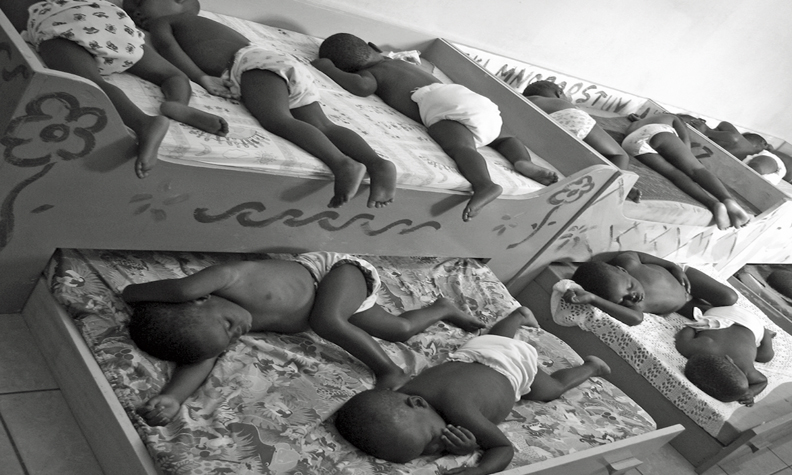
Thomas Froese
Children sleep in the Amani Baby Cottage, an orphanage in Jinja, Uganda.
(The Hamilton Spectator – Saturday, January 27, 2024)
MUKONO, UGANDA – There’s a red dirt road in front of the university guest house where I sometimes sit, in the doorway, barefooted. I watch the African sunrise. And the monkeys. I listen to the birds. Or watch children pass by. They remind me of Hannah, our youngest.
“Hello,” several said the other day, waving.
“Hello,” I said.
“How are you?” they said. “Are you fine.
“Yes,” I said. “I’m fine.”
“Happy New Year,” one said, and I said the same. They laughed. “Nice to see you,” said another, and I said it was nice to see them too. One repeated, “Happy New Year,” before there was silence and before the last one then said, “Good night.”
Gosh, my heart felt like it would burst in the purity and humour of the moment. It was, in fact, about noon.
The dirt road leads to a playground that Ugandan children still use. With some help, I’d built it years ago. Across from the playground, on a hill, is a simple bungalow with a faded tin roof, the modest home that my family built and lived in during our dozen years here.
Travel the opposite direction and the road goes through this campus’ green rolling hills to the main road. Turn east and eventually reach a beach town on Lake Victoria called Jinja. It’s the source of the Nile River. And the source of Hannah.
There’s an orphanage there that my wife and I had visited once. I took a photo of the youngest children sleeping, row-by-row, in little pull-out beds. They were something. A few years later we returned, and found Hannah. Or she found us.
Of course, there are plenty of orphans, about 140 million, in the world. Almost one-third are African. Uganda has more than two million. If they’re not with an aunty or grandmother, they’re in one orphanage or another. Many are loved deeply. Some are neglected horribly.
But you don’t pick up a child from a place like Uganda like you pick up a bag of groceries. There are processes. Developing nations frown on westerners wanting to blow in and adopt children without care for their culture. And even while Hannah was with us, in foster care, from the start, the winding road to full, legal adoption taught us the patience of Job.
The Jinja court “lost” the adoption files. Judges were absent. Bribes, common enough, were not given by us. “So I’m not in this family?” Hannah once asked after yet another strange occurrence. Still, we – our family of five – continued life together, one day at a time, including Hannah, in the adventure of it.
Five years into proceedings, the phone call came. Adoption was approved. The call came, fittingly-enough, on Hannah’s eighth birthday.
Years later, in 2017, we returned full-time to Canada. The kids needed to know Canada better. Now it’s the 10th anniversary of that celebratory phone call. In fact, the day before I got on a plane to fly to Uganda for some teaching, we celebrated Hannah’s 18th. She herself now plans to be a teacher, for younger kids, like those near my guesthouse doorway.
Sitting here, I just had another conversation. He was a young man. I was touched by his face, his countenance and spirit of humility. He’d been lining up work abroad, but, in the effort to migrate, lost all his savings.
“Things happen for a reason,” he said to me. He smiled when I asked how to say this in his local language. “Eyo eyi ki ‘yeru asisile si,” he said. It’s true. Hannah knows. Or maybe things just happen, but, with reasoning and time, we can still make something good of it.
This is the least we can do, wherever we find ourselves. Get out. Say hello. Look in someone’s face. Hear their story. Maybe even appreciate another language. And remember the children. It’s all that this old world has, really. Remember they grow up, too.

The children. Our hope for the future and the best of us. Well said Thomas.
“Or maybe things just happen, but, with reasoning and time, we can still make something good of it.” I felt a deep “amen” in my spirit. Thank you, Thom.
Steve K.
You’re welcome.
Indeed, the future’s hope.
Thom: I miss the years that we sat together at that guest house. Thank you for so vividly bringing it back with this post. Greet all for me.
Hi Thom – Thanks for your thoughts today. Your photo from Jinja and the vivid descriptions of Mukono roads and its travellers brought back the rich experiences you and Jean gave to Betty and I volunteering for Save The Mothers projects throughout Eastern Uganda. You have made a difference in this world of disproportionate rewards and your columns help bring our attention to those less fortunate communities than ours, offering hope for the future.
“This is the least we can do, wherever we find ourselves. Get out. Say hello. Look in someone’s face. Hear their story. Maybe even appreciate another language.” This is so valuable to do, to get out and say hello and take the time to hear their story. It gives value to every human being. “Akushe,” which means well done in Yoruba.
Thanks for the language lesson, Rick.
Good memories with you in East Africa, for sure, Henry.
Every time I sit down for breakfast at that table I keep expecting you’ll somehow just show up one morning, Dave.